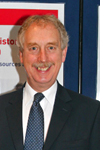 Mass digitisation and its impact on cultural heritage, education and research communities
Mass digitisation and its impact on cultural heritage, education and research communities
OR
How do we make a lot of stuff useful to a lot of people?
Chris Batt, Chief Executive, Museums, Libraries and Archives Council
A lot of stuff is easy, a lot of people is possible but useful is a bit more tricky… What struck me from yesterday’s Symposium is that it was very much a discussion from the inside and there is a need to step back and look at the outside, the outer landscape of where we are now. Risk that if we don’t do that we are looking at the engine without knowing what the car is doing.
I’m known as ‘last minute Batt’ so have been still jiggling slides around this morning trying to make sense of it so it’s a very fresh presentation…Let’s see where we get to!
What are we really aspiring to achieve? My philosophy is that all that we do should lead to a Universal Right to Knowledge. At MLA we produced a doc ‘Investing in Knowledge’ to argue that the unifying force driving MLAs is that they are knowledge organisations but they also contain the raw material of the future.
In a mature knowledge society knowledge supports all sorts of things – learning identioty, development – but it must include everyone.
1. Knowledge and ideas are the raw material of our futures
2. Learning must be for life
3. Understanding of the world around you builds empowerment, community cohesion.. but not about formal education
Just how tricky is ‘useful’?
The challenge is to empower every person to take learning journeys. May be no more than finding the time of the next bus out of Cardiff but might be trying to understand some element of genetic engineering. How do we do this learning journey stuff?
Three building blocks to useful access to knowledge:
1. The only successful technologies are the invisible ones. Who worries about how a tv or telephone works?
Web 4.0: We need to build some kinds of simple maps of relationships to understand what we mean by the different words we use. We need to digitise/describe – disclose – aggregate/discover – presentation.
Presentation is the only bit that matters – it needs to be invisible to people. Danger is that unless we think about presentation we live in a “land of informed bewilderment”.
2. The value chain. The defining feature of the MLA is that they have collections, they serve customers and to do that they make connections. One part of that is internal so the collections and connections are within the institutions, and part are external – the customers. Unless you think about how all three fit together you risk sub-optimising the organisation.
We need the massification of relevant content, not the duplication of lost if institutions. Examples of institutions on the web, from 24 Hour Museum to National Trust to Intute. Civil servants say “look at all these great things we’ve done – they are out there for people”. Reality is that for 99% of people, the world is Google and, unless you know what you are looking for, the world is invisible. Unless you know what you are looking for you will not necessarily find things eg what’s on the shelves of your local library round the corner. I don’t think Google will ever do that and yet that’s the learning journey that needs to be taken.
3. Public value architecture
Public funds – Black box – Services/Outcomes/Trust
MetroNet example – half a billion pounds just in drafting the contract and it’s now gone down in flames. What dos that say about the chances about puttiing together a long term deal which will be robust for another 50 years or so?
Compared with fighting a war the cost of mass digitisation is minute yet the benefits much greater.
We have a failure of effective advocacy. We need to talk with confidence and passion, have a shared narrative to convince other people of the benefits. This is why the Strategic Content Alliance is so great.
What should we aspire to?
- Knowledge is the fuel of the future
- Lifelong learning must be universal
- Learning is a person experience
- Content first, institution second
- Institutions must work together
- The future is already here
In 2040 I want knowledge to be a utility: as trusted, as accessible and as invisible as pure running water. Cheers!
